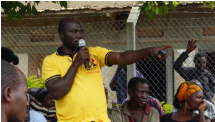Bilharzia Campaign Radio Show Guide
This document outlines and provides guidelines for a central element of the Bilharzia Media Campaign in Uganda, 2016-2017 – a series of radio call-in talk shows featuring Bilharzia experts. The talk shows were reinforced with DJ mentions, radio spots, a jingle, and a series of short radio skits in 9 languages. The broadcast stations of broadcast were carefully selected to reach 47 districts where Bilharzia was most prevalent plus Kampala, where Bilharzia is less common but still an issue, particularly among communities on the lake.
Primary audiences were men and women between 20 and 45 years of age and their school age children living in areas where Bilharzia is particularly prevalent, as well as health workers, teachers and leaders in areas where Bilharzia is particularly prevalent.
The objectives of the programs were to:
- To increase awareness about Bilharzia and how to prevent it.
- To increase the audience’s perceptions of risk for Bilharzia.
- To encourage listeners to adopt practices that reduce their risk of Bilharzia and it’s consequences.
The programs achieved the following goals:
- Provided information to listeners about Bilharzia—what it is, it’s consequences, and how to prevent it.
- Provided information to listeners about realistic, practical actions they can take to prevent Bilharzia and minimize its consequences.
- Promoted use of latrines or toilets and never defecating or urinating near or in a body of water.
- Encouraged listeners to take advantage of the MOH’s free distribution of Bilharzia medicine every year to prevent serious consequences of Bilharzia.
Source: Ministry of Health, Uganda
Date of Publication: March 25, 2019
SIMILIAR RESOURCES
Tools
Examples
- Open WHO
- Dengue Clinical Case Management Online Course
- Accelerator Behaviors
- Emergency Preparedness and Response Training
- Community Mosquito Control
- Men's Reproductive Health Curriculum
- Zika and Pregnancy: Questions and Answers
- Prevention of Sexual Transmission of Zika Virus
- Zika Virus Global Emergency Response Plan
- WHO Pregnancy Management in the Context of Zika Virus

